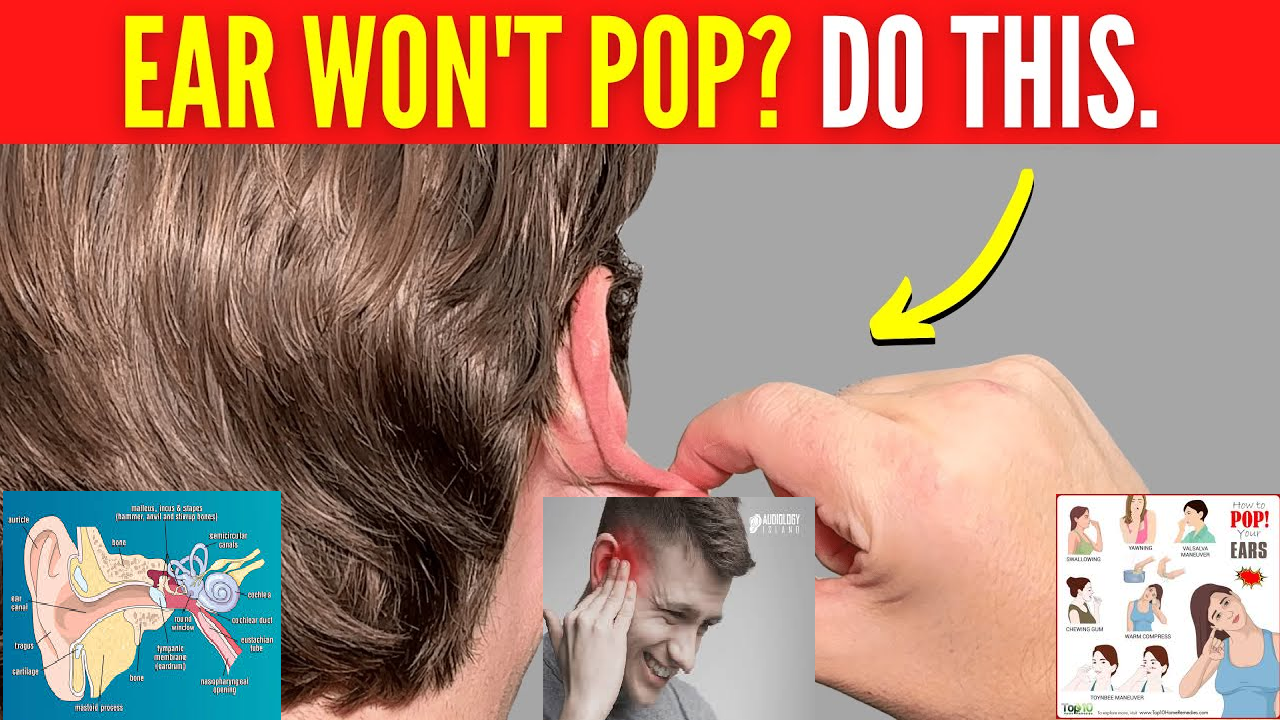Feeling like your ears are blocked or won’t pop can be frustrating and even painful. This sensation, known as ear barotrauma or ear pressure, can result from various causes like altitude changes, sinus congestion, ear infections, or even water or wax buildup. Understanding how to pop your ears safely can help relieve discomfort and restore your ear's natural pressure balance.
How to Pop Your Ears
If you’re experiencing pressure in your ears, there are several techniques to help relieve it:- Swallowing or Yawning Swallowing or yawning can help open the Eustachian tubes, which can relieve ear pressure. Chewing gum or sucking on candy can also trigger this reflex, helping your ears to pop naturally.
- The Valsalva Maneuver Gently pinch your nose closed, take a deep breath, and attempt to exhale with your mouth shut. This can create pressure that may open the Eustachian tubes and help pop your ears. Be cautious not to blow too hard to avoid damaging your eardrum.
- The Toynbee Maneuver Take a sip of water, pinch your nose, and swallow. The combined actions of swallowing and closing your nose can help equalize pressure in the middle ear.
- Warm Compresses Placing a warm washcloth over your ear can help relieve sinus congestion or ear blockages caused by colds or infections, often helping your ear to pop.
- Over-the-Counter Decongestants For sinus-related pressure, an over-the-counter decongestant or antihistamine can help reduce swelling and congestion, making it easier for your ears to pop.
How Do You Unblock Your Ears?
Blocked ears can result from various issues, and knowing the underlying cause can help guide the right solution. If you’re struggling with unblocking your ears, try these methods:- Hydration and Humidification: Keeping hydrated and using a humidifier can thin mucus and relieve congestion, which often helps unblock the ears.
- Nasal Sprays: Using saline or medicated nasal sprays can reduce nasal congestion, indirectly helping your ears unblock.
- Jaw Exercises: Gently stretching your jaw, moving it from side to side, or doing circular motions can help relieve pressure and allow your ears to unblock.
Why Do Ears Pop When Sick?
When you’re sick, especially with a cold or sinus infection, the Eustachian tubes can become blocked by inflammation and mucus buildup. Since these tubes regulate ear pressure, any blockage can result in pressure build-up that leads to ear popping. Additionally, as you recover and the mucus begins to drain, you may experience ear popping as pressure normalizes.How Long Does a Blocked Ear Last?
A blocked ear can last anywhere from a few hours to several days, depending on the cause. If it’s due to altitude changes or mild congestion, it may clear up quickly. However, blockages due to ear infections, sinusitis, or wax buildup may last longer and could require specific treatments to resolve.How to Unblock Ears from Water
Water trapped in the ear canal, commonly experienced after swimming or showering, can cause discomfort and muffled hearing. Here are a few methods to help remove water:- Tilt Your Head and Tug Your Earlobe: Gently pulling on your earlobe while tilting your head may encourage water to drain out.
- Gravity Drainage: Lie down with the affected ear facing down. Sometimes, the water will drain naturally.
- Use Rubbing Alcohol and Vinegar Drops: A few drops of a 1:1 mixture of rubbing alcohol and white vinegar can help evaporate the water and kill any bacteria in the ear canal.
How to Unblock Ears Full of Wax
Earwax buildup can lead to a blocked ear sensation. If wax is the culprit, try these approaches:- Over-the-Counter Ear Drops: Softening drops can help dissolve earwax over time, allowing it to exit the ear canal more easily.
- Hydrogen Peroxide: A few drops of hydrogen peroxide in the ear can break down wax buildup.
- Warm Water Flushing: Using a gentle bulb syringe, you can flush warm water into your ear canal to dislodge and remove earwax. Make sure to avoid forceful water sprays, as these can damage your ear canal.
How to Crack Your Ears
Cracking your ears is similar to popping them. Yawning, swallowing, and performing the Valsalva or Toynbee maneuvers can cause the small sounds associated with relieving ear pressure.What Happens if Your Ear is Blocked for Too Long?
If your ear remains blocked for an extended period, it can lead to issues like ear infections, hearing loss, and persistent discomfort. Long-term blockage can also make you prone to dizziness and balance issues, as the ear plays a crucial role in maintaining equilibrium. If you’ve had a blocked ear for more than a week or are experiencing pain, it’s best to see a healthcare provider. They can examine your ear, identify the cause, and provide the appropriate treatment to prevent complications.How to Unpop Your Ears After a Flight
Flying can lead to ear popping due to rapid altitude changes that affect air pressure. Here are ways to unpop your ears after a flight:- Try Swallowing, Yawning, or Chewing Gum: These activities stimulate muscles that open the Eustachian tubes.
- Use the Valsalva Maneuver: This technique can help relieve the pressure caused by altitude changes.
- Stay Hydrated: Drinking water and staying hydrated can keep mucus thin, reducing the chances of congestion in the ears.
- Earplugs for Pressure Changes: Pressure-regulating earplugs are designed for flights and can help prevent and relieve pressure during takeoff and landing.
Read more :
1= https://dapachecker.co.uk/how-to-pray-the-rosary-a-step-by-step-guide/
2= https://dapachecker.co.uk/how-to-potty-train-a-puppy/
3= https://dapachecker.co.uk/what-do-you-do-if-your-ears-wont-pop-how-to-pop-your-ears/
